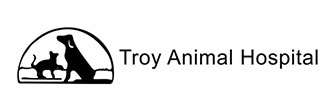AAHA Accredited
AAHA-Accreditation is the Standard of Veterinary Excellence
Did you know? Nearly 60% of pet owners believe that their pet’s veterinary hospital is accredited when it is not. We’re proud to say that we’ve gone the extra mile to earn accreditation from the American Animal Hospital Association!
Troy Animal Hospital chose to become AAHA Accredited to ensure that your pet receives the highest quality care possible. AAHA Accreditation is not mandatory and only 15% of veterinary hospitals in the USA choose to go through the rigorous evaluation process necessary to become accredited.
Every 3 years we undergo comprehensive evaluations (on 900 standards of veterinary care) by AAHA veterinary experts. Areas covered include quality of care, pain management, surgery, pharmacy, laboratory, exam facilities, medical records, cleanliness, emergency services, dental care, diagnostic imaging, anesthesiology, and continuing education.
Why is This Important to You?
By selecting an AAHA Accredited hospital you can be pretty sure that your pet will receive state-of-the-art care. AAHA Accredited hospitals hold themselves to a higher standard and are recognized as the finest in the industry. They are consistently at the forefront of advanced veterinary medicine.
Established in 1933, AAHA is the only veterinary association exclusive to companion animals and is best known for its accreditation of companion animal practices like Petaluma Veterinary Hospital...
The AAHA's mission is to:
- Enhance the abilities of veterinarians to provide top-quality medical care to companion animals
- Enable veterinarians to successfully conduct their practices and maintain their facilities with high standards of excellence
- Meet the public's needs as they relate to the delivery of small animal veterinary medicine
Unlike human hospitals, veterinary hospitals are not required to be accredited. Accredited practices are the only hospitals that choose to be evaluated on approximately 900 quality standards that go above and beyond basic state regulations. These range from patient care and pain management to staff training and advanced diagnostic services
To maintain accredited status, hospitals undergo comprehensive on-site evaluations every three years, which ensures that hospitals are compliant with the Association's mandatory standards. Because the accreditation process is so thorough and rigorous, some states are beginning to accept AAHA accreditation in lieu of state inspections.

